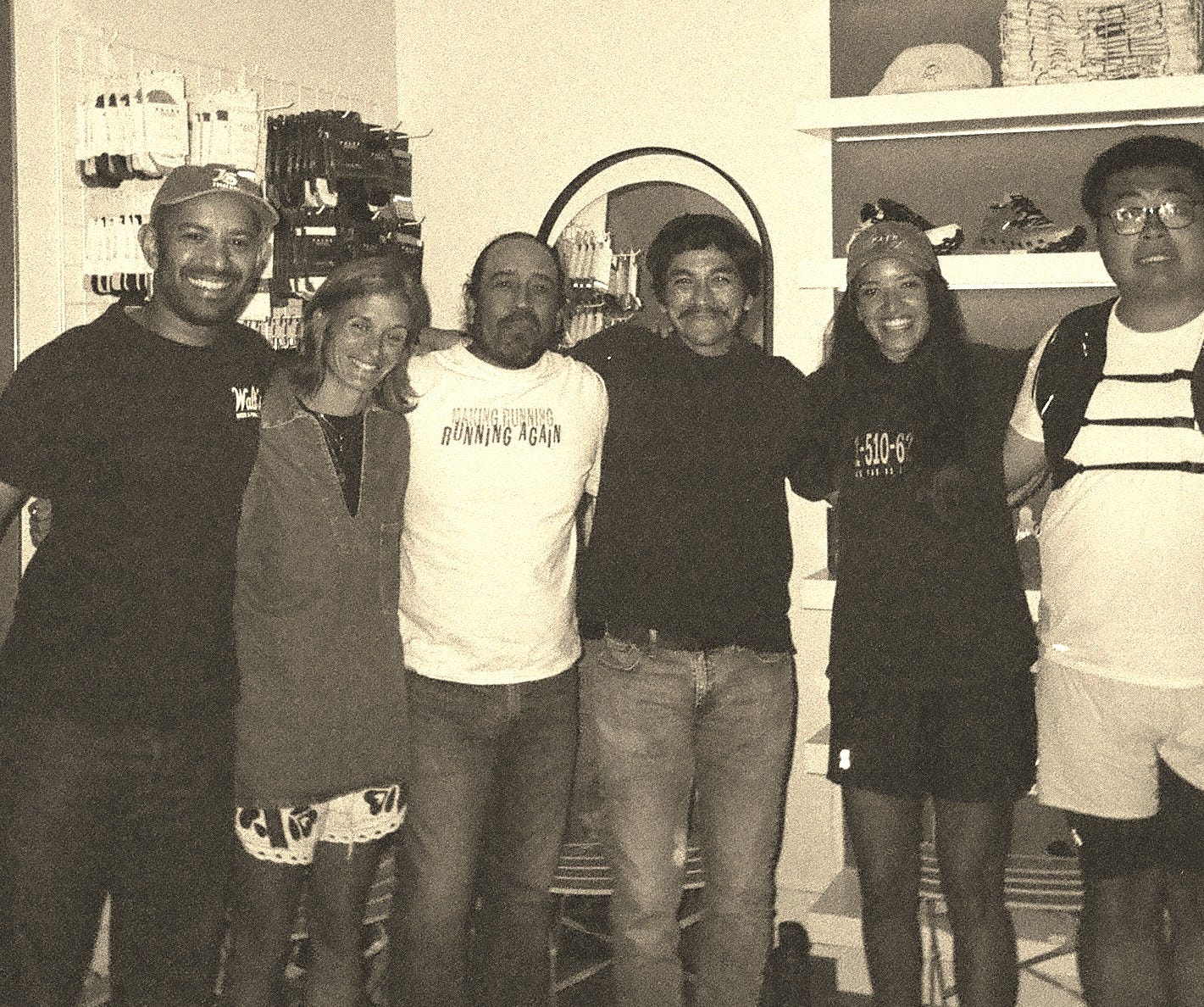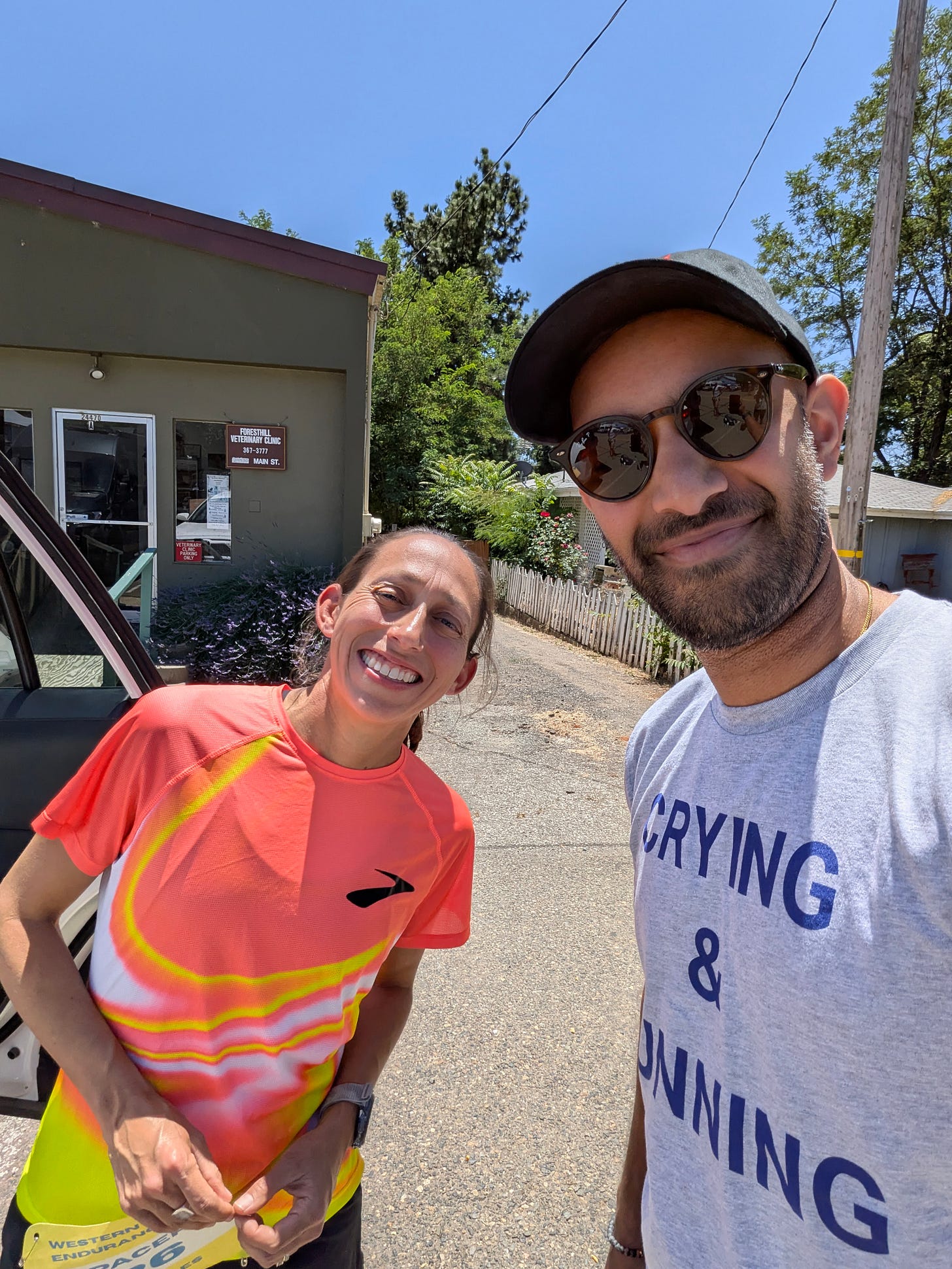A run club leader, a journalist, and a brand rep walk into a running store...
What happened next was a debate on consumerism, and how brands, stores, and crews fit together.
I just returned home from 48 blistering hours in Northern California, where I first hosted a panel on Consumerism in Running in San Francisco, and then drove a few miles east to watch the frontrunners of the Western States Endurance Race at the 100km mark, and back again. What a weekend, jam-packed with fantastic people.
Consumerism in Running
On Friday evening, I was joined by some great minds at Running Wylder in San Francisco, and oh wow did we have some hot opinions and crucial insights.
Armando Torres, co-founder of Nth Degree Athletic Club
Abel Rodriguez, co-captain of Corremos Sacramento
Rosie Cruz, On representative, working with crews and stores across NorCal
Katie Douglas of Running Wylder in her beautiful store
Why do runners need to talk and think about consumerism?
There is an estimated 25 million more runners in 2025 than in 2020
75% of runners earn 50% over the median salary (please speculate why in a comment!)
Brands are getting involved in both events and in communities like never before
Our conversation followed the themes of ethics, sustainability, and community. I was going to edit this down to the bare bones of the sentiments shared, but there were so many key quotes unlocking amazing truths, so here goes.
The pressures of purchasing in run clubs
Abel: “There’s a sense of wanting to belong, and when you come out to a running club, you look at all this cool stuff that people have, and you're like, ‘I need all of that.’ It's really easy to succumb to the marketing that comes with that of not only do you need this to belong, but you need this to be adequate at running.”
Rosie: “People who are new to running often think that buying a product equates to them getting to their goals, but there's no shortcut to training. You get strong because you're out there every day, and you're with your community, and you're pushing each other. You don't get strong by buying some super shoe. We live in a world where we want shortcuts. We want to get there as fast as possible, and being in a capitalist society, we want to find the easiest way to get there, but running doesn't lie.”
Building correct partnerships
Abel: “Corremos Sacramento was founded as a safe place for marginalized runners. That's become quite difficult to mesh with current events. If you view running as being an apolitical thing, you have your community members hurting constantly, and you're never addressing it. We have found ourselves in a position where we have to do what we can to protect them and to avoid partnerships that will hurt them. A partnership with REI in particular was a topic that we debated for a while because there was a time when REI endorsed the nominee for Secretary of Interior, and it was a Trump nominee – someone who we thought was trying to do a lot of damage to the environment. That kind of issue comes up frequently.”
Katie: “There are some very big brands that you won't ever see on our shelves. It’s really important for me to speak to the founder and that they’re a great person. The apparel brands I carry are very small, and I think they have the leisure of deciding what they want their platform to look like. I used to work at Old Navy, and I remember the circular conversation I would have that sustainability is important, but they say the consumer won't pay more. The brand should have the ethics to be sustainable because they care about it. I definitely pay attention to where brands are getting things manufactured, but it's conversations with actual founders about what they care about and their focus that matter. It’s about staying connected and appreciating what the brand stands for, and if that stops, being okay with that being my last buy from them.”

Partnering community with commerce
Katie: “One of the main reasons I wanted to open the store was that I wanted to create a sense of community, and I see the store as the axis of a wheel connecting all the spokes. I would much rather partner with run clubs than start my own run club because you guys have been putting in the work. I see the store as a way to get more people to your run club versus using the run club to promote the store. I see the store as a safe neutral space, where if you know the store or me, it’s not scary to show up and make friends with 50 new people.”
Armando: “I was thinking about what bothered me, and it’s brands having this feeling that they need to create their own run clubs. It's annoying that you have a community of amazing, eclectic run clubs surrounding you, but you feel the need to put ‘running club’ beyond your name. Some local gym just did that, and the people that were there were all generally from one of the clubs. Why didn’t they just collaborate with this club or that, so that part of it is very annoying.”
How to lead in a capitalist society
Abel: “As a leader, I’m not quiet about my feelings on anything, and I’m very opinionated about a lot of stuff, sometimes to my detriment, but I have found that the more we speak out as a club, the more our members are committed to coming. When we first started speaking out in October 2023 when the genocide of Gaza had started, that was the first time that I we had really made a political statement, and it was not well-received by a lot of people, but it felt important.
Rosie: “Something I think about a lot is the quote: ‘A master's tools will not dismantle the master's house.’ I work for a brand that is a huge corporation that puts out a lot of waste, and what is my place in that brand if I'm anti-capitalist and doing the things that I'm preaching against politically? As a BIPOC woman from Oakland, it's really important for me to be in a place of power at a brand making decisions of where resources are allocated, and I think that's what Abel and Armando see in me and how they trust me. I'm really not interested in brand success. I'm interested in how I can pull resources to help people, and I get to be the decision maker. The more that you have people who look like us, speak like us, move like us at brands, the more that these communities get resources that make the runners more comfortable.”
Armando: “What are we doing that's sustainable in the long term? Theoretically, all the athletes that come to us are consumers. In a certain way, I feel like I'm competing against other clubs, but what hasn't changed from day one is not this over promise of linking up with this brand, and creating the greatest events ever. That's just not sustainable in the long term. Commit to what you can and be consistent with it. A lot of these clubs are coming out hot and at one point the brands themselves are going to start fading back, and once those brands fall, what are you going to offer as a community, as a club?”
Future trends
Rosie: “It's not sustainable for people to have an armory of product, and the Earth is begging for us not to do that. We should care about the land that we're running on and the environment that we're running in, and hopefully the crews that exist in our cities start to talk more and protest more about that as an issue. They are the culture drivers and culture creators. Ultimately, if you can project the notion that we should have less and that we should swing the pendulum that way, then brands follow.”
The underlying themes that came out of our conversation about consumerism in running, and our path forward, is one of deepening human connection.
Think deeply about what you need to buy, why you’re buying it, and who you’re giving your money to.
If you are a run leader, let your principles guide your decisions, rather than brand partnerships. That identity will ultimately lead to you nurturing your community.
The superficiality of purchasing more and more material goods leads to equally superficial relationships. You’re worth more than that.
Tell the running industry that you want less or more, either vocally, or with your wallet.
When relationships are purely transactional, it’s difficult to build community as strangers, so build relationships gently and properly to grow together.
Purchasing from an independent store fits the well-understood concept of shopping local, invigorating the local economy and community.
If brands hire correctly, like On has with Rosie, the partnerships will come, and they will be organic, effective, and appreciated.
In an increasingly fragmented society, it’s easy to forget that what humans need the most is other humans. American Individualism is the pervasive culture that is being thrust with force around the world, but there is a better way. As runners, we know that spending time outdoors is time well spent. We know that building community is a beautiful thing.
This conversation arose from my article on running culture, where I suggested that running stores were part of the problem, and Katie from Running Wylder used grace and humor to put me straight on that, reminding me that running stores are brilliant community hubs, and usually the kind of local businesses that we should crave in our neighborhoods.
And it’s true. Her store is exactly the kind of uniquely beautiful space that I want more of in the world. In major urban hubs, we’re getting an increasing number of highly curated running boutiques, but there’s a theme of the same premium brands sold at the vast majority of them — the racks can begin to look a little similar. Running Wylder, however, has an eclectic attention to detail in both the brands and individual products that means it doesn’t remotely suffer from that.
I could explain further, but if you’re in San Francisco, you simply have to visit. More photos from the evening on IG, of course.
A podcast to listen to
I spent a long time in the car this weekend, so I got through a huge amount of podcasts, and I really loved last Tuesday’s The Faith Episode of Nobody Asked Us with Des Linden and Kara Goucher.
It was a great breakdown of how much of an ask it was to knock 7 seconds off Faith Kipyegon’s own magnificent world record. I saw somewhere before the race (so it might not be true) that the suit was tested on another elite athlete and it gave them a 3% advantage, and while it ultimately didn’t quite happen, everyone was watching and dared to dream for 4 mins.
It was evidence that when Nike is good, they can be great. By making sure that whatever technology or platforms you personally have, there was no barrier to watching Breaking4, they ensured maximum coverage and maximum impact. I watched it via YouTube on my phone sitting on the floor of a hospital with my youngest, for instance! (He’s fine.)
A crucial point that I think has at least been skirted over was how Nike did more for track in that half hour of coverage than Grand Slam Track did over their whole first season. Especially with the cancellation of the Los Angeles date.
My first Western States
Incidentally, I went to Western States and Des Linden was the first person I met at Foresthill Elementary School. I’d just finished listening to the retirement episode of her podcast!
Caleb Olson won while wearing an odd-looking new Nike ACG top that was heavily reminiscent of the brand’s mesh shirts that featured in the 2000 Olympics — one of my favorite Games. It was a heavy garment, that looked to soak up water, presumably to aid cooling as he ran through 100°F and sunny conditions.
I personally made the mild mistake in that weather of wearing jeans to spectate and got almost as many comments about that faux pas as the Running & Crying t-shirt I was wearing.
My enduring thought about WSER struck me while looking around: the inclusivity initiative by the organizers of Broken Arrow Skyrace was the most necessary thing in the world. Foresthill was a sea of whiteness. Not too many bad apples bobbing around out there, I’m sure of that, but as one of the very few non-white people, it felt somewhat uncomfortable nonetheless.
Running Sucks Haiku of the Week
Running & Crying…
Runner’s high? Nah. Runner’s cry.
Tell them it’s just sweat?
So many hormones are released during a run: endorphins, dopamine, endocannabinoids, cortisol. It’s a veritable cocktail of neurochemicals coursing through our bodies as we run, and that’s why we know of running as an act that can change our moods.
Yes, we can use a run to relieve stress, process thoughts and emotions, and generally elevate our demeanor, but it can also encourage a release. It can help disarm us enough to break that societal barrier that encourages us not to admit to the ‘weakness’ of needing to cry, but crying is actually very similar to running. Crying leads to the release of many of the same hormones that running does.
Running makes you feel better, but crying also makes you feel better, so why not do both?
Housekeeping
UPGRADE - Upgrade your subscription for just $1 a week. It is the top way to support my work and quality journalism, and you get a lot of benefits as well.
BUY ME A COFFEE - Think of it as a tip jar for my writing.
SUPPORT - If you can’t upgrade your subscription, sharing my newsletter with another runner is a great way to upgrade for free while spreading the word.
MERCH - Get that Running & Crying t-shirt while you still can. Sometimes you wear a piece of clothing that makes everyone who sees it laugh. This is that.
WIN - Upgraded subscribers can win a $100 Janji gift card every single week of 2025. And you can win once a month! 100s of dollars of potential winnings…
GET FREE STICKERS - Get 5 Running Sucks stickers for FREE. I will send you an envelope stuffed with stickers for you to stick on your water bottle and share with your friends. Yes, I’m cool.
CONNECT WITH ME - Instagram / Strava
Thanks for reading
Raz x








“There is an estimated 25 million more runners in 2025 than in 2020” 25 million?? Did I read that right?
“75% runners earn more than 50% over the median salary”
My 2cents on this is that running like many sports or activities is a luxury to be able to do. It’s something one can pursue once certain comfort is achieved, comfort in the form of stable and enough income- to eat, sleep, have a roof over ones head, take care of family and then have some more money, time and energy. Which is why i feel there could be similarities in terms of the kind of people we find the sport popular amongst, not just financial but other aspects as well.
Though I feel time and energy when it comes to something like running one can take out because inherently it’s an activity that someone does solely for them selves.